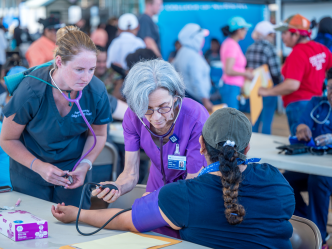The weather is warming and after a long, socially distanced winter, the sunshine and outdoors is calling. Answering that call is a great way to lift your mood and socialize safely during the pandemic.
Just don’t forget your sunscreen.

According to Dr. Germame Ajebo, an oncologist at the Georgia Cancer Center at Augusta University, melanoma is the fifth most common cancer in both men and women in the United States. Nearly 80,000 new cases are diagnosed annually, with 9,000 resulting in death.
“Although it accounts for about 5% of all skin cancers, melanoma is responsible for more than 75% of skin cancer deaths,” he said.
Most melanomas — approximately 70% — appear as superficial tumors on the skin and they can stay there for several years. In many cases, melanomas can be surgically removed and not require any additional treatment. If they grow deeper into the dermis, the cancer could run the risk of metastasizing or spreading to other organs. In that instance, treatment may include immunotherapy or targeted therapy.
Some patients have higher risk for melanoma than the rest of the population, such as people who have a light complexion, red or blonde hair, those older than 55 or have moles that resemble melanomas but are often benign.
Schedule an appointment with your dermatologist if you notice any of the following signs:
- A mole that changes in shape, color or size
- A mole that has three or more colors
- A mole that is asymmetrical or lost its symmetry (divided in half, the sides do not match)
- A mole that is bleeding
- A mole that looks like it is filled with blood, is pigmented or is growing
- If there is a new, pigmented line under a nail
Protect yourself by applying a broad-spectrum sunscreen that is at least 30 SPF every day, especially if you plan to be in the sun for more than 10 to 15 minutes. Many products combine moisturizer and sunscreen, which make application easy and convenient.
 Augusta University
Augusta University




